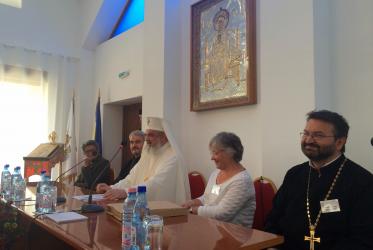Displaying 1 - 18 of 18
WCC leaders recall life-changing experiences from early days
10 February 2022
New student body at Bossey Ecumenical Institute “a source of joy”
14 September 2020
Mission is the essence of Christian life, says Orthodox theologian
15 November 2018
Romani people seek “lives of decency, dignity, and justice”
27 September 2018
WCC commission reflects on challenges of ecumenical formation
10 October 2017
Ioan Sauca is awarded an honorary doctorate by Romanian university
05 November 2015
WCC urges responsibility for and support to the refugees in Europe
04 September 2015
WCC Executive Committee speaks out on migrant crises
12 June 2015
WCC concerned about anti-homosexual bill in Uganda
22 December 2009












